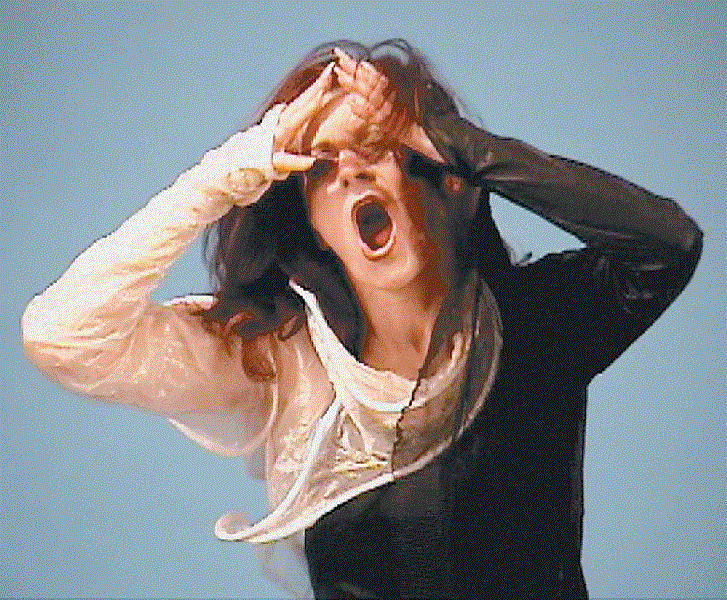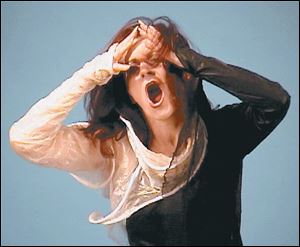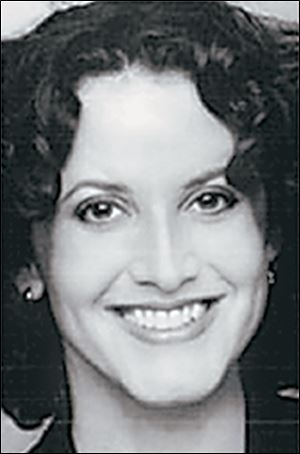
Out of horror come hope, inspiration
4/22/2005
Dancer/choreographer Celesta Haraszti performs to the music of Tikvah.

Dancer/choreographer Celesta Haraszti performs to the music of Tikvah.
When Burton Beerman was first approached with the idea of writing music about the Holocaust, he was hesitant.
"So much has been done about the Holocaust, with so much angst," said Beerman, a composer, clarinetist, and Bowling Green State University professor.
Then he read the memoirs of Philip Markowicz, a Toledoan who survived the Nazis' Auschwitz-Birkenau death camp during World War II, and he changed his tune.
"It was absolutely amazing," Beerman said of the memoirs. "It wasn't about the Holocaust but about what Judaism is to me - it was about surviving and it was about hope."
His composition, entitled Tikvah: A Concert of Hope and Remembrance, will be presented Tuesday night at BGSU.
It will be the first presentation of the full 80-minute piece, although segments were performed last fall at the Toledo Museum of Art, receiving a standing ovation, and at the University of Michigan and University of Missouri. The official premiere of Tikvah will be in Atlanta next month.

Andrea Rae
Beerman said that although Markowicz endured horrors almost beyond belief, he never let them defeat him. His story inspired Beerman to write music that is both uplifting and positive despite the tragedies.
"It's more than optimism, it's a spiritual sense that we will survive - not to live forever, but to live another day," Beerman said.
Accompanying the music will be video illustrations by BGSU artist Heather Elliott-Famularo, including scenes of the Holocaust and a photo of Markowicz when he was being sent to Auschwitz, with the Nazis' notation on his papers, in English, stating: "Reason for Arrest: Jew."
Beerman said the images serve an important role as a counterpoint to the upbeat nature of the music. The composition, a blend of classical, jazz, and klezmer, is classified as "new music," he said.
Markowicz, 81, was born in Poland, the son of a rabbi, and was highly regarded as a child scholar of the Torah. As the Nazis took over Poland, he was sent along with other Jews to the Lodz Ghetto, working in the sweatshops and continuing his studies of the Torah and Talmud.
He said that when he arrived at the Auschwitz-Birkenau camp, he was not chosen to be a slave laborer. Quickly realizing he would be sent to his death in the gas chambers, Markowicz sneaked into a work detail when the German guards were not watching.
When the American troops liberated the death camp in 1945, the 5-foot-10 Markowicz weighed a mere 87 pounds.
He immigrated to the United States after the war, and then moved to Tol-
edo in 1950, where he opened a successful appliance store, Phil's TV.
After the war, Markowicz rarely spoke about the Holocaust, explaining that it was painful to recall the events and that most Americans knew about it and were uncomfortable hearing more horror stories. But over the decades, people were less aware of the Nazi atrocities and he felt it was "a duty and obligation to speak out."
Markowicz said he spent about 10 years writing his memoirs, which he calls My Three Lives. The book has not yet been published.
The music of Tikvah (Hebrew for "hope") features the Atlas Saxophone Quartet, led by Brian Polacek, pianist Stanley Yerlow, dancer/choreographer Celesta Haraszti, and vocalist Andrea Rae, a professional singer and Markowicz's granddaughter.
The saxophone was chosen as the primary instrument not just for its wide musical range and rich tones, but because the instrument is a symbolic "outsider," banned by the Nazis who considered it "decadent, American, and Jewish," Beerman said.
Rae, a 1989 graduate of Ottawa Hills High School, has lived in New York for nine years and is currently performing in the musical Hair at the Downtown Cabaret Theater in Bridgeport, Conn.
"My grandfather has gone through so much in his life, so much strife, and yet he continues to live life and to find meaning in life," she said. "He somehow is able to still find the good and find the positive in all his surroundings."
While Tikvah is based on Markowicz's memoirs, it also represents a general view of people who overcome adversity, she said.
"It doesn't necessarily have to be the Holocaust," Rae said, "but any sort of terrible ordeal that somebody goes through and still finds hope and still is able to continue on with life."
Beerman said that while composing Tikvah, he personally overcame a severe accident in June, 2003, when he was hit by a truck and nearly died. He has a prosthetic left arm because of the accident, he said, and only recently has been able to resume playing the clarinet.
"I wrote most of this while I was recovering from the accident, and this work is so uplifting, it's almost magical," he said.
"Tikvah: A Concert of Hope and Remembrance," will be presented at 7:30 p.m. Tuesday in the Bryan Recital Hall at Bowling Green State University. The concert is free and open to the public. Information: 419-372-2531.
Contact David Yonke at:
dyonke@theblade.com
or 419-724-6154.